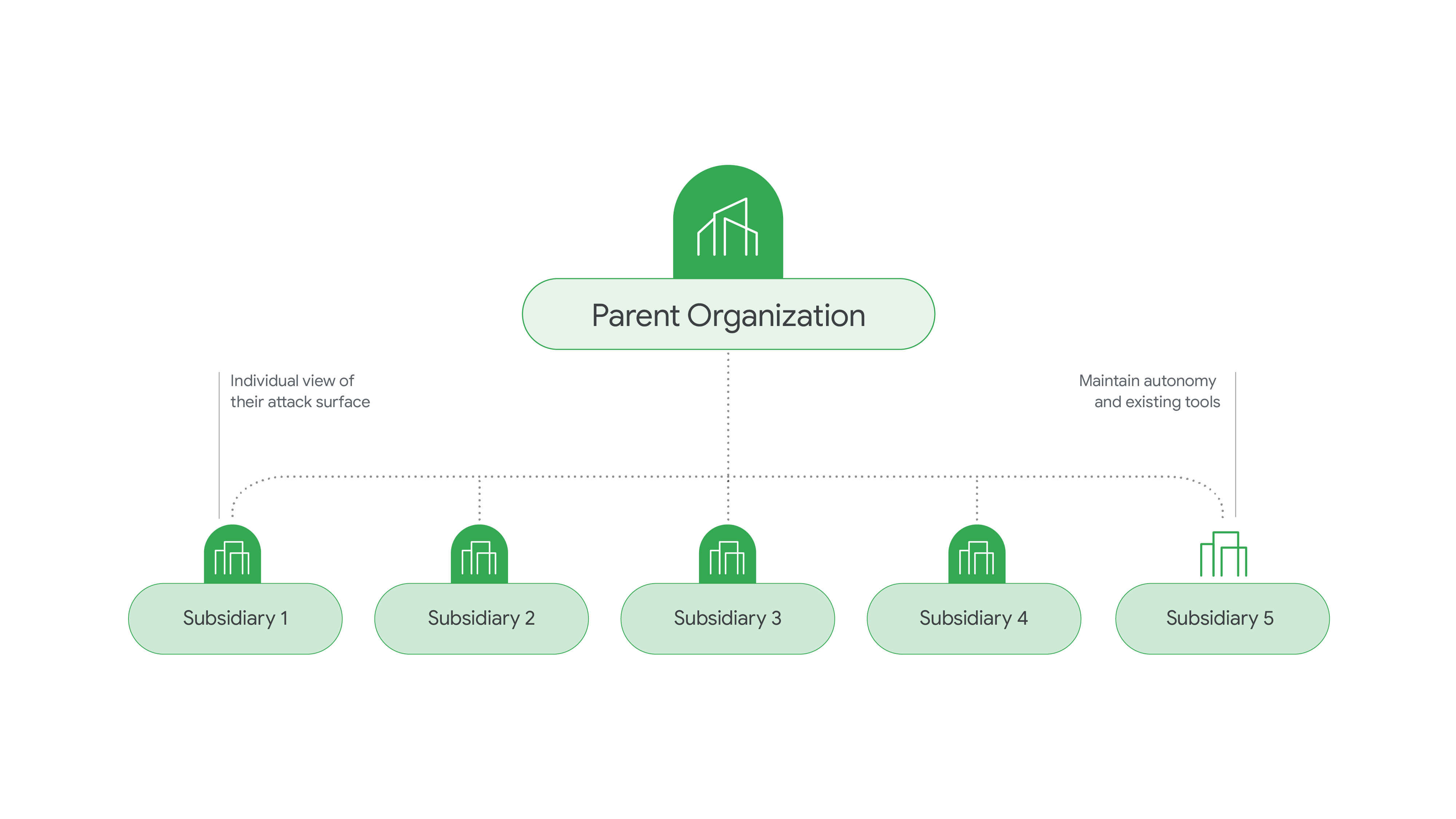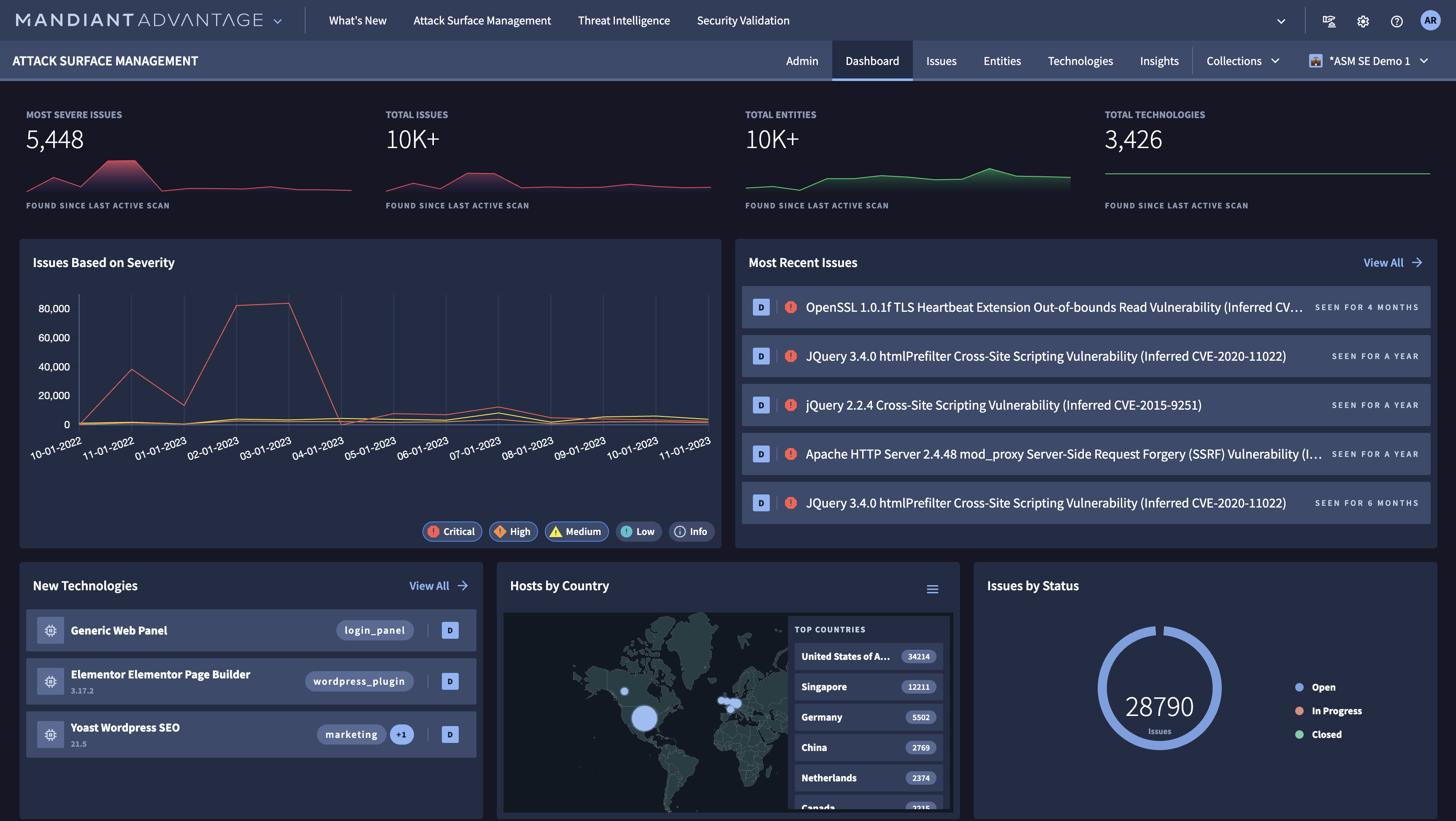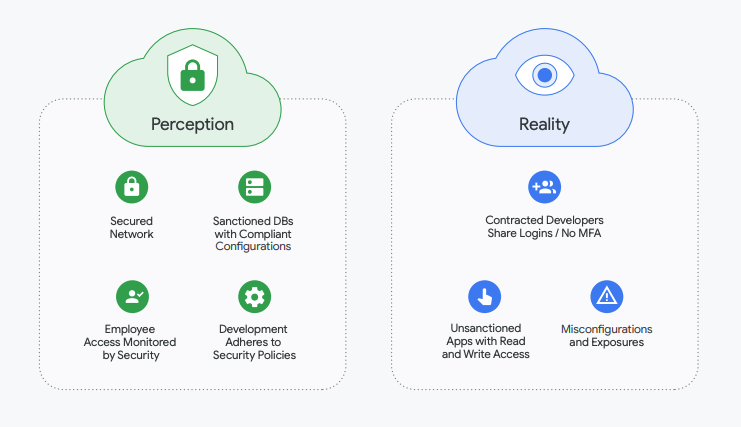Mandiant Attack Surface Management
See your organization through the eyes of the adversary
Through Mandiant Attack Surface Management (ASM), discover and analyze your internet assets across today’s dynamic, distributed, and shared environments, while continually monitoring the external ecosystem for exploitable exposures.
Features
Continuous monitoring
Control how often asset discovery and analysis are conducted with daily, weekly, or on-demand scans.
Technology and service identification
Get an inventory of applications and services running in the external ecosystem.
Outcome-based asset discovery
Specify the type of asset discovery workflow run against the attack surface based on specific outcomes or use cases.
Read more about outcome-based asset discovery.
Active asset checks
Active asset checks are benign payloads or scripts designed from Mandiant IOCs and frontline intelligence, and are used to validate when an asset is susceptible to exploitation.
How It Works
Mandiant Attack Surface Management (ASM) offers the adversary's view of your organization's attack surface. Starting with simple information about the organization (such as a domain, known networks, or SaaS accounts), it collects asset and exposure information like an attacker would.
Mandiant Attack Surface Management (ASM) offers the adversary's view of your organization's attack surface. Starting with simple information about the organization (such as a domain, known networks, or SaaS accounts), it collects asset and exposure information like an attacker would.
Common Uses
Assess high-velocity exploit impact
Identify shadow IT
Uncover unmanaged or unknown assets
Learning resources
Uncover unmanaged or unknown assets
Multicloud asset discovery
Mergers and acquisitions due diligence
Evaluate an acquisition’s external security posture
Learning resources
Evaluate an acquisition’s external security posture
Subsidiary monitoring
Centralize portfolio visibility and risk mitigation
Learning resources
Centralize portfolio visibility and risk mitigation
Pricing
| How pricing works | Mandiant Attack Surface Management pricing is based on the number of employees at your organization, and all paid subscriptions include a base fee. | |
|---|---|---|
| Subscription | Description | Price |
Self-assessment | Continuously monitor the expanding attack surface. | Connect with sales to discuss tailored enterprise pricing. |
How pricing works
Mandiant Attack Surface Management pricing is based on the number of employees at your organization, and all paid subscriptions include a base fee.
Self-assessment
Continuously monitor the expanding attack surface.
Connect with sales to discuss tailored enterprise pricing.
Business Case
Mandiant Attack Surface Management customers have provided their real-world testimonials in Gartner Peer Insights™.
Learn what customers think of Mandiant ASM
Gartner Peer Insights anonymous review
"Mandiant Advantage Attack Surface Management, recommended!"
Related content

Ascendium partners with Mandiant experts to increase cybersecurity

Even the battlefield: Know more about your attack surface than the adversary
Gartner® and Peer Insights™ are trademarks of Gartner, Inc. and/or its affiliates. All rights reserved. Gartner Peer Insights content consists of the opinions of individual end users based on their own experiences, and should not be construed as statements of fact, nor do they represent the views of Gartner or its affiliates. Gartner does not endorse any vendor, product or service depicted in this content nor makes any warranties, expressed or implied, with respect to this content, about its accuracy or completeness, including any warranties of merchantability or fitness for a particular purpose.
Featured benefits
Deeply understand your technology ecosystem.
Know when assets change to stay ahead of the threat.
Mitigate real-world exposure risk.
FAQ
What is attack surface management?
Attack surface management is an approach to cyber defense that assesses and monitors external and internal assets for vulnerabilities, as well as risks that can potentially impact an organization.
An attack surface management solution continuously discovers and assesses an organization’s assets for vulnerabilities, misconfigurations, and exposures.
What is the difference between an attack surface and attack vector?
An attack vector is an exploitable asset in the attack surface. An attack vector can be used by a threat actor for initial compromise.
What does an external attack surface management solution do?
At Google Cloud, we define external attack surface management as the automated and continuous discovery of internet-facing assets and cloud resources, assessed for technology relationships and the identification of vulnerabilities, misconfigurations, or exposures.
What are some attack surface examples?
Examples of attack surfaces include domains, IP ranges, data repositories, websites, servers, email, cloud resources, applications, microservices, and employees.
What is required to use Mandiant Attack Surface Management?
Onboarding is simple. All we need is a domain, IP address, URL, or netblock.
How does attack surface management reduce attack surfaces?
To reduce the overall attack surface, attack surface management solutions generate an asset inventory and alert the security team to exposed assets that can be targeted for exploitation.
Customers are empowered to use their preferred SIEM, SOAR, or ticketing system to facilitate remediation and attack surface reduction. Mandiant Attack Surface Management supports integrations with Chronicle Security Operations, Cortex XSOAR, Splunk Enterprise, and ServiceNow. Customers often use the API to retrieve data from Mandiant Attack Surface to send to their preferred SIEM, SOAR, or Ticketing Systems.















